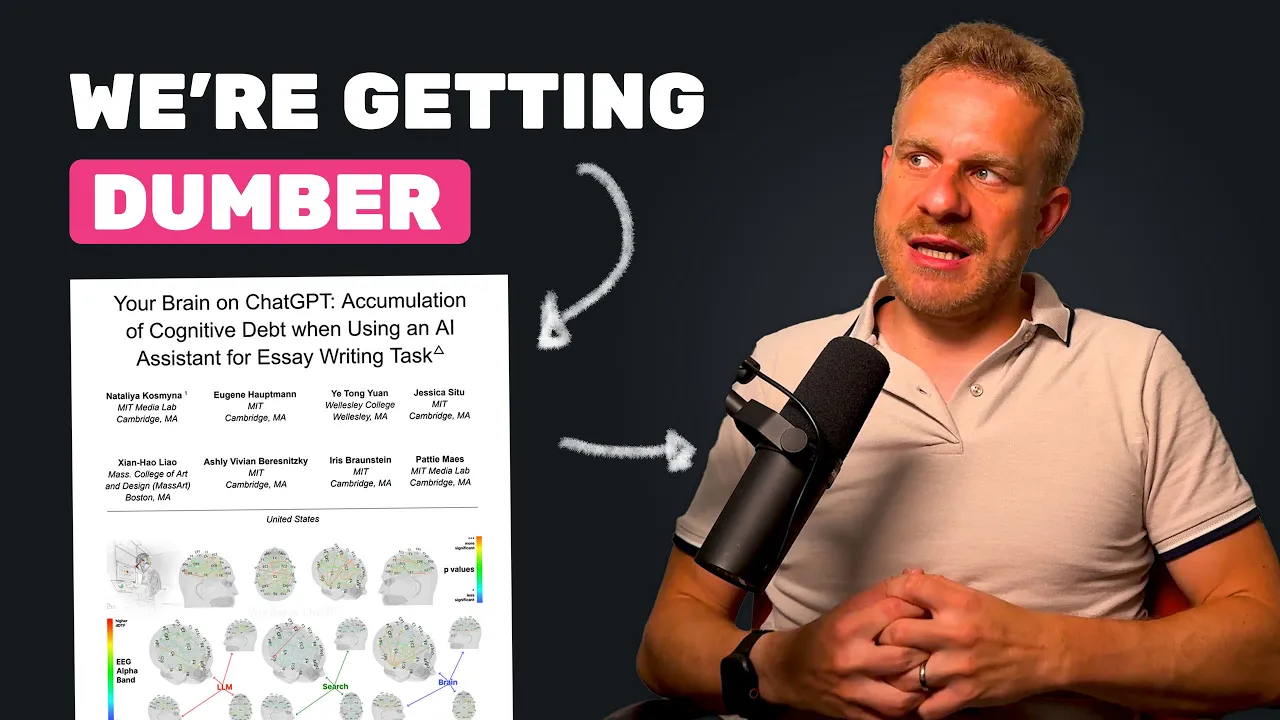
A recent MIT study examining the impact of large language models (LLMs) like ChatGPT on brain activity has revealed concerning findings that every developer should consider. The research measured brain activity when performing writing tasks with and without AI assistance, showing significantly reduced cognitive engagement when relying heavily on AI tools—a finding with profound implications for software development practices.

The MIT Study: Structure and Key Findings
The MIT research divided 54 participants into three distinct groups to write essays on standardized test topics. Each group had different tools at their disposal:
- LLM Group: Allowed to use only ChatGPT (no web search)
- Search Engine Group: Allowed to use web search and websites (no AI chatbots)
- Brain-Only Group: No internet access or AI tools, relying solely on their knowledge
The results, while not entirely surprising, provided measurable evidence of what many developers might intuitively suspect. The LLM group showed significantly less brain activity compared to both other groups. Additionally, participants in this group:
- Mostly copied and pasted AI-generated content with minimal editing
- Demonstrated poor recall of their essay content when tested
- Exhibited less ownership of the produced work
- Showed dramatically reduced cognitive engagement throughout the task
Parallels to Software Development: Common Developer Mistakes with AI Tools
These findings directly parallel what many developers experience when using AI coding assistants. One of the most common mistakes software developers make is over-relying on AI-generated code without fully understanding it—a pattern that can lead to several problems:
- Difficulty debugging or modifying the code later due to lack of familiarity
- Potentially introducing security vulnerabilities or inefficiencies
- Reduced learning and skill development over time
- Diminished ability to think critically about architectural decisions
When developers allow AI to generate significant portions of code without proper review or understanding, they risk making the same mistake as the study participants—outsourcing their thinking to the AI rather than using it as a complementary tool.

Different Levels of AI Usage in Development
Not all AI assistance is created equal. There's a spectrum of AI usage in development, ranging from minimal to extensive:
- Base Level: Using AI only for autocompletions and small code suggestions
- Intermediate Level: Having AI generate moderate chunks of code with developer review and modification
- Advanced Level: Employing agentic mode where AI generates entire features across multiple files
- Planning Level: Using AI primarily for architecture planning rather than code generation
One of the common mistakes web developers make is jumping straight to the advanced level without considering the cognitive trade-offs. When AI generates large portions of code, developers often find themselves in unfamiliar territory, as if reviewing code written by someone else—potentially someone with questionable coding practices.
The Efficiency Paradox: When AI Makes You Slower
Counterintuitively, having AI generate too much code can sometimes decrease efficiency rather than improve it. This paradox occurs because:
- Understanding AI-generated code takes time, especially when issues arise
- Debugging unfamiliar code is often more challenging than debugging self-written code
- Modifying AI-generated code to meet specific requirements can be time-consuming
- The mental context-switching between AI-generated sections creates cognitive overhead
This efficiency paradox represents one of the most common mistakes made by beginner developers—assuming that more AI assistance always equals faster development. The reality is much more nuanced, requiring a thoughtful balance between automation and manual coding.
Strategies for Balanced AI Usage in Development
To avoid the common developer mistakes highlighted by the MIT study, consider these strategies for more balanced AI usage:
- Deliberately choose tasks to complete without AI assistance to maintain cognitive skills
- Use AI primarily for feedback and analysis rather than initial code generation
- Create your own architectural plans first, then use AI to refine them
- Request smaller, more manageable code chunks rather than entire features
- Always review and understand AI-generated code before implementing it
By intentionally limiting AI usage for certain tasks, developers can ensure they maintain their problem-solving abilities while still benefiting from AI's efficiency advantages.

Flipped Roles: When Humans React Instead of Guide
Perhaps the most concerning finding from both the MIT study and real-world development experiences is the tendency for roles to flip—where humans begin reacting to AI output rather than guiding the AI. This represents a fundamental shift in the human-AI relationship that can lead to several coding errors and developmental stagnation.
When developers merely react to AI-generated code rather than actively directing the development process, they risk:
- Losing ownership of the codebase
- Diminishing their critical thinking skills over time
- Becoming dependent on AI for solving even simple problems
- Failing to develop the architectural thinking necessary for career advancement
Finding the Right Balance: A Framework for Developers
To avoid the common mistakes that companies make when they switch to AI-assisted development, consider implementing this framework:
- Planning Phase: Create architectural plans manually, then use AI for refinement
- Learning Phase: Tackle new concepts manually before using AI to expand knowledge
- Production Phase: Use AI for boilerplate and repetitive code, but write core logic manually
- Review Phase: Employ AI to analyze your code for improvements, not to replace your analysis
- Maintenance Phase: Understand all code thoroughly before making AI-assisted modifications
This framework helps maintain the proper relationship between developer and AI—where the human remains the guide and the AI serves as the assistant, not the other way around.
Conclusion: Preserving Cognitive Skills in an AI-Assisted World
The MIT study provides valuable empirical evidence for what many developers have intuitively felt—that excessive reliance on AI tools can reduce cognitive engagement and potentially diminish problem-solving abilities over time. This doesn't mean we should abandon AI assistance, but rather that we need to be more intentional about how we use these powerful tools.
By understanding the common mistakes developers make with AI tools and implementing strategies to maintain cognitive engagement, we can harness AI's benefits while preserving the critical thinking skills that make human developers valuable. The goal should be a complementary relationship where AI enhances human capabilities rather than replacing them—keeping our brains active and engaged even as we leverage increasingly powerful AI assistants.
As we continue to navigate this evolving landscape, the most successful developers will be those who find the right balance—using AI as a powerful tool while maintaining their own cognitive abilities and ownership of their work.
Let's Watch!
MIT Study Reveals How AI Coding Assistants Impact Developer Brain Activity
Ready to enhance your neural network?
Access our quantum knowledge cores and upgrade your programming abilities.
Initialize Training Sequence